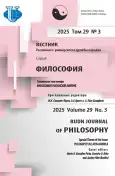The Evolution of the Muslim Reformation Movement of the XX-XXI Centuries
- 作者: Stepanyants M.T.1
-
隶属关系:
- Institute of Philosophy of the Russian Academy of Sciences
- 期: 卷 29, 编号 3 (2025): PHILOSOPHY IN LATIN AMERICA
- 页面: 819-831
- 栏目: HISTORY OF PHILOSOPHY
- URL: https://journal-vniispk.ru/2313-2302/article/view/325476
- DOI: https://doi.org/10.22363/2313-2302-2025-29-3-819-831
- EDN: https://elibrary.ru/DHHAVI
- ID: 325476
如何引用文章
全文:
详细
Russian research in the 1960s and 1980s focused on four main areas of public consciousness in Muslim countries: orthodoxy, modernism, reformism, and Renaissance. These trends were distinguished by their terminological diversity and ideological heterogeneity, which made it difficult to adequately understand Islamic ideological processes. Orthodoxy denies social progress based on its belief in the perfection of Islam as the last divine prophecy that does not need to be renewed. Paradoxically, modernists share the thesis of the incompatibility of Islam and progress, on the contrary, they call for the adoption of Western values for social prosperity. Reformers strive for changes within the framework of spiritual traditions, whereas revivalism is extremely ambiguous and can be reactionary or progressive. By the beginning of the 21st century, the reformation movement in Islam was practically divided into two main trends. The archaic version of the trend proceeds from a predominantly formalistic understanding of religion, according to which a return to authentic Islam is identified with a literal return to the historical form of Islamic practice in the first centuries of the Hijrah. The renovation option aims to preserve not the form, but the content adapted to the new conditions. The article focuses on the views of the Egyptian philosopher Nasr Hamid Abu Zayed and the Russian theologian Damir Mukhetdinov. Both are developing the concept of a “renewal theology” aimed at rethinking traditions, taking into account modern realities and a variety of approaches, including exegesis, philosophy and social sciences. The success of this concept depends on the deconstruction of the legalistic (narrow-legal) paradigm and the transition to the ethical-mystical paradigm (“theology of renewal” in the proper sense of the word).
关键词
作者简介
Marietta Stepanyants
Institute of Philosophy of the Russian Academy of Sciences
编辑信件的主要联系方式.
Email: marietta_35@mail.ru
ORCID iD: 0000-0001-6176-5718
SPIN 代码: 4802-4342
DSc in Philosophy, Professor, Chief Researcher
12/1 Goncharnaya St., Moscow, 109240, Russian Federation参考
- Gordon-Polonskaya LR. Muslim Trends in the Social Thought of India and Pakistan. Moscow: Nauka publ.; 1962. (In Russian).
- Belenky AB. The National Awakening of Indonesia. Moscow: Nauka publ.; 1965. (In Russian).
- Stepanyants MT. Philosophy and Sociology in Pakistan. Moscow: Nauka publ.; 1967. (In Russian).
- Levin ZI. The Development of the Main Trends of Social and Political Thought in Syria and Egypt. Moscow: Nauka publ.; 1972. (In Russian).
- Ionova AI. “Muslim Nationalism” in Modern Indonesia. Moscow: Nauka publ.; 1972. (In Russian).
- Stepanyants MT. Muslim Concepts in Philosophy and Politics (19th–20th Centuries). Moscow: Nauka publ.; 1982. (In Russian). EDN: SZFYPR
- Maudoodi AA. Towards Understanding Islam. Delhi: Idara Tarjuman ul Quran; 1961.
- Iqbal M. The Reconstruction of Religious Thought in Islam. Lahore; 1962 Available from: https://www.thesufi.com/The_Reconstruction_of%20Religious_%20thought_ in%20Islam_by_%20Allama%20_Iqbal.pdf (accessed: 10.10.2025).
- Karunakaran KP. Religion and Political Awakening in India. Meerut: Meenakshi Prakashan; 1965.
- Parvez GA. Letters to Selim. Vol. 1. Karachi; 1953.
- Mukhetdinov DV. Preface. In: Zayd NHA. The Reformation of Islamic Thought: A Historical and Critical Analysis. Moscow: Medina publ.; 2024. (In Russian).
- Zayd NA. Reformation of Islamic thought: a critical historical analysis. Amsterdam: Amsterdam University Press; 2006.
- Mukhetdinov D. Theology of Renewal. Islamic Neomodernism and the Problem of Tradition. Moscow: Medina publ.; 2023. (In Russian).
- Zayd NHA. Rethinking the Qur’an: Towards a Humanistic Hermeneutics. Utrecht: Humanistics University Press; 2004.
- Zaid NA, Nelson ER. Voice of an Exile: Reflections on Islam. New York: Praeger Publishers; 2004. https://doi.org/10.5040/9798216032731
- Zayd NHA. The Reformation of Islamic Thought: A Historical and Critical Analysis. Moscow: Medina publ.; 2024. (In Russian).
- Jaspers К. Die philosophische Autobiographie. In: K. Jaspers. Shilpp PA, hrsg. New York; Zurich; 1957.
- Kuznetsov VA. Problems of Political Development in the Arab World in the 2010s and 2020s: dissertation for the degree of doctor of political sciences: Мoscow; 2024. (In Russian).
补充文件









